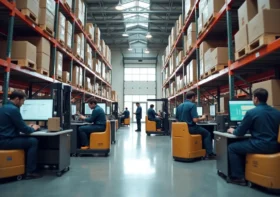The Role of Artificial Intelligence in Shaping Modern Work

Artificial intelligence has moved beyond the realm of science fiction into everyday workplaces. Its influence stretches across industries, transforming how tasks are performed, decisions are made, and strategies are developed.
As organizations strive to maintain competitiveness, understanding AI’s role in shaping modern work has become increasingly critical. From optimizing routine processes to redefining human-machine collaboration, AI is reshaping professional roles and organizational structures.
This article explores how artificial intelligence is impacting work across multiple sectors and the ways it continues to shape the future of labor.
Contents
AI in Engineering Management
Engineering management has traditionally relied on human judgment for planning, resource allocation, and quality control. The introduction of AI into these processes has begun to redefine managerial practices. Predictive analytics, for instance, allows teams to anticipate project bottlenecks and identify potential risks before they escalate.
In the context of AI and innovation in engineering management, machine learning models can analyze large datasets from past projects to forecast timelines, optimize supply chains, and reduce operational inefficiencies. This integration does not replace managers but equips them with tools that improve decision-making and enhance strategic planning, allowing organizations to respond to complex challenges with greater precision and insight.
Automation and Task Efficiency
The arrival of AI-driven automation has transformed how organizations handle repetitive and operationally heavy tasks. Jobs that once required significant hours of manual work, such as invoice processing, scheduling, data entry, and routine compliance checks, can now be completed in a fraction of the time with intelligent systems.
Customer service operations are a clear example where AI-powered chatbots manage thousands of inquiries simultaneously, providing consistent and accurate responses at any hour of the day.
In manufacturing, robotic systems guided by AI monitor equipment performance, predict maintenance needs, and adjust production lines without requiring constant human oversight. These applications reduce delays, lower costs, and minimize human error, allowing businesses to maintain a more reliable workflow. For employees, automation offers the opportunity to redirect their focus toward complex assignments that demand analytical thinking, interpersonal skills, and creativity.
The redistribution of responsibilities creates a more dynamic workplace where people can contribute to areas that machines cannot fully replicate. This shift does not signal the end of human labor but rather an evolution of roles where technology supports workers by removing repetitive burdens.
Organizations that embrace this approach are able to increase productivity, maintain higher standards of accuracy, and respond more effectively to changing demands in competitive markets.
Data-Driven Decision Making
Artificial intelligence provides organizations with the ability to extract meaning from data at a scale that would be nearly impossible for human teams alone. Businesses in every sector collect enormous volumes of information from customer interactions, supply chains, production cycles, and digital platforms. The challenge lies not only in storing this information but in transforming it into actionable knowledge.
AI systems excel at this task by identifying patterns, correlations, and anomalies that might remain hidden in conventional analysis. For instance, retailers can use AI to forecast purchasing behaviors, adjusting inventory levels and marketing campaigns in real time, while financial institutions rely on predictive models to detect fraudulent activity before it causes significant harm. Healthcare providers benefit from AI-driven diagnostics that interpret medical records, imaging, and genomic data to recommend tailored treatments.
Decision-makers across these industries no longer need to depend exclusively on intuition or historical precedent; they can now rely on evidence-backed insights that improve accuracy and reduce uncertainty. Another advantage lies in the speed with which AI can process information, allowing executives and managers to respond rapidly to market shifts, customer needs, or operational disruptions.
This shift toward data-driven cultures not only strengthens competitive positioning but also encourages organizations to adopt transparency and accountability in their decision-making processes. When decisions are guided by measurable evidence produced through AI analysis, businesses reduce risk, gain efficiency, and open opportunities for innovation that would remain undiscovered through traditional methods.
Workforce Transformation
The integration of AI into workplaces is shifting the roles and responsibilities of employees in noticeable ways. Routine jobs that rely heavily on repetitive processes are increasingly being supported or replaced by intelligent systems, which changes how people contribute within their organizations.
Many employees are moving toward roles that focus on oversight, coordination, and collaboration with AI systems rather than carrying out the same tasks themselves. Training programs are expanding to address these changes, offering workers opportunities to develop technical literacy, data analysis skills, and the ability to interpret AI-generated insights.
The emphasis on adaptability and continuous learning is reshaping career paths, encouraging professionals to seek new ways of combining their expertise with emerging technologies. This transformation also prompts businesses to think about ethical considerations, such as fair labor practices, equitable access to training, and maintaining human judgment at the center of decision-making.
The workforce of the future will likely be defined by its ability to integrate human creativity and emotional intelligence with the analytical strengths of AI, creating a dynamic partnership between people and machines.
Enhancing Creativity and Problem Solving
Artificial intelligence is often associated with automation and efficiency, yet its role in supporting creativity and complex problem-solving is becoming increasingly apparent. In fields such as architecture, product design, and scientific research,
AI tools can process enormous datasets to identify unique connections that spark new ideas. For instance, generative design software can suggest hundreds of prototypes for a single project, giving engineers and designers a range of possibilities that they might not have imagined on their own. AI is not confined to providing answers; it encourages exploration by highlighting patterns that challenge conventional thinking.
In collaborative settings, AI assists teams by running simulations, modeling scenarios, and testing hypotheses at speeds far beyond human capability. Researchers in medicine use AI-driven analysis to uncover potential treatment pathways, while businesses rely on intelligent platforms to predict consumer behavior and refine product development.
These applications demonstrate that creativity is no longer solely a human endeavor but a partnership between human insight and machine-driven analysis.
The widespread adoption of AI raises critical ethical questions surrounding privacy, accountability, and bias. Organizations must navigate these challenges while integrating AI into their operations to maintain trust with employees and customers.
Transparent algorithms, regulatory compliance, and ongoing monitoring are crucial to mitigating risks associated with decision-making by machines. Looking ahead, AI will continue to evolve, influencing job structures, industry practices, and economic models.
Companies that approach AI thoughtfully, balancing technological potential with ethical responsibility, are likely to gain a sustainable advantage in the emerging landscape of work.



